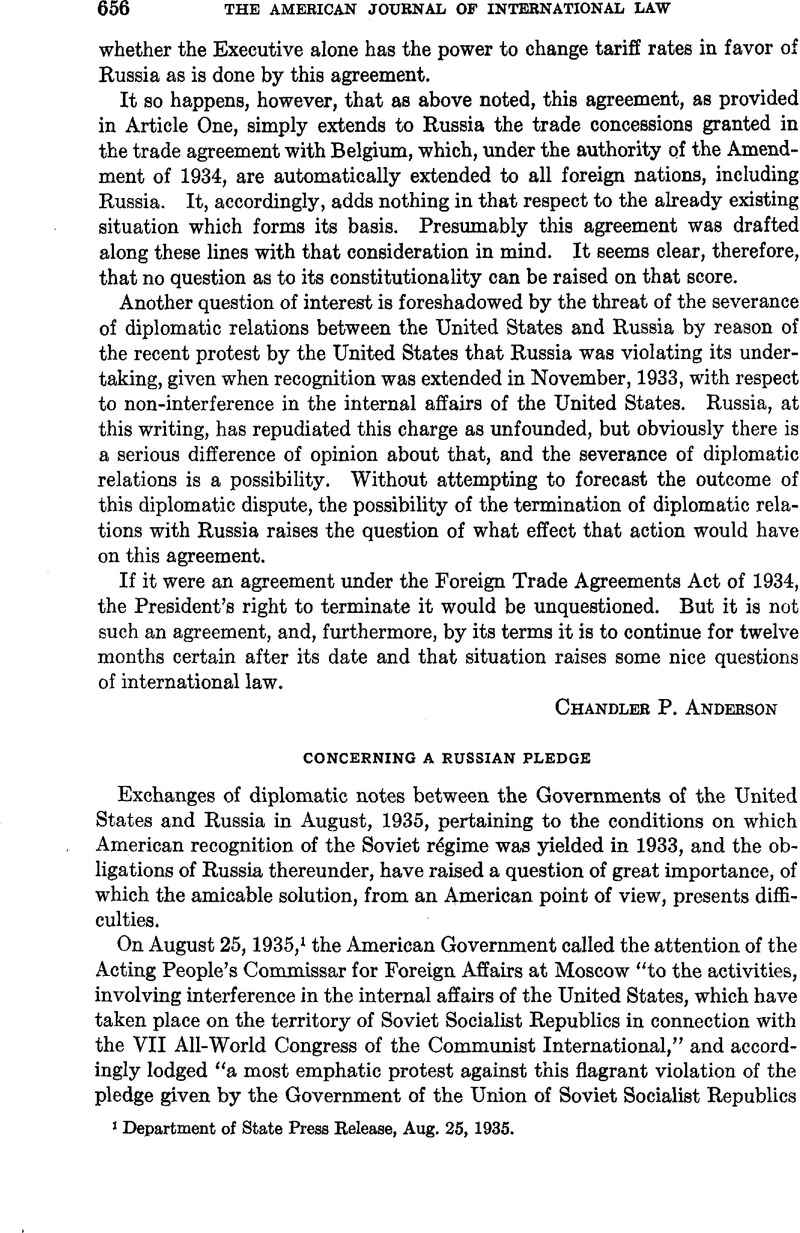No CrossRef data available.
Published online by Cambridge University Press: 12 April 2017

1 Department of State Press Release, Aug. 25, 1935.
2 The pledge referred to was embraced in a communication addressed by Mr. Litvinoff, People's Commissar for Foreign Affairs, to President Roosevelt, in the following terms: “I have the honor to inform you that coincident with the establishment of diplomatic relations between our two Governments it will be the fixed policy of the Government of the Union of Soviet Socialist Republics: “
1. To respect scrupulously the indisputable right of the United States to order its own life within its own jurisdiction in its own way and to refrain from interfering in any manner in the internal affairs of the United States, its territories or possessions. “
2. To refrain, and to restrain all persons in government service and all organizations of the Government or under its direct or indirect control, including organizations in receipt of any financial assistance from it, from any act overt or covert liable in any way whatsoever to injure the tranquillity, prosperity, order, or security of the whole or any part of the United States, its territories or possessions, and, in particular, from any act tending to incite or encourage armed intervention, or any agitation or propaganda having as an aim, the violation of the territorial integrity of the United States, its territories or possessions, or the bringing about by force of a change in the political or social order of the whole or any part of the United States, its territories or possessions. “
3. Not to permit the formation or residence on its territory of any organization or group —and to prevent the activity on its territory of any organization or group, or of representatives or officials of any organization or group—which makes claim to be the Government of, or makes attempt upon the territorial integrity of, the United States, its territories or possessions; not to form, subsidize, support or permit on its territory military organizations or groups having the aim of armed struggle against the United States, its territories or possessions, and to prevent any recruiting on behalf of such organizations and groups. “
4. Not to permit the formation or residence on its territory of any organization or group —and to prevent the activity on its territory of any organization or group, or of representatives or officials of any organization or group—which has as an aim the overthrow or the preparation for the overthrow of, or the bringing about by force of a change in, the political or social order of the whole or any part of the United States, its territories or possessions.“
3 “Nor does it appear necessary,” it was said, “to list the names of representatives or officials of the communist organization in the United States who were active at the above mentioned Congress and whose admission into the territory of the Union of Soviet Socialist Republics, was, of course, known to the Government of the Union of Soviet Socialist Republics.“
4 Dept. of State Press Release, Aug. 27, 1935.
5 He added in this connection: “The Government of the Union of Soviet Socialist Republics sincerely sharing the opinion of the Government of the United States of America that strict mutual non-interference in internal affairs is an essential prerequisite for the maintenance of friendly relations between our countries and steadfastly carrying out this policy in practice declares that it has as its aim the further development of friendly collaboration between the Union of Soviet Socialist Republics and the United States of America responding to the interests of the people of the Soviet Union and the United States of America and possessing such great importance for the cause of universal peace.“
6 Dept. of State Press Release, Aug. 31, 1935.
7 See Dept. of State Press Releases of Aug. 10 and Aug. 18, 1920. Declared Secretary Hughes, in the course of a communication to Mr. Samuel Gompers, President of the American Federation of Labor, July 19, 1923: “What is most serious is that there is conclusive evidence that those in control at Moscow have not given up their original purpose of destroying existing governments wherever they can do so throughout the world. Their efforts in this direction have recently been lessened in intensity only by the reduction of the cash resources at their disposal. You are well aware of the experiences of the American Federation of Labor in this aspect of the situation which must be kept constantly in view.“
8 Note from Secretary Hughes to Mr. Samuel Gompers, July 19, 1923.
9 The United States might be unwilling to permit the fact of the repudiation of the Soviet pledge to assume the form of a question for adjudication, and it might doubt the efficacy of an award purporting to obligate Russia to curb the activities of the Communist International directed against the United States. Russia, on its side, might be expected to be unwilling to permit the relationship between the Soviet Government and the Communist International to be aired in an international forum, and still less to run the danger of having an arbitral court hand down a denunciatory decree shot through with formal orders obliging it to take disagreeable steps to check the activities of that body.